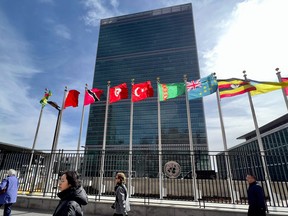‘The erosion of trust and their capacity going forward … would be a serious concern’
Article content
The majority of Canadians and Americans do not trust the United Nations, according to a new poll.
The Leger survey for the Association for Canadian Studies (ACS) and the Metropolis Institute was conducted about four months after Hamas attacked Israel on Oct. 7, 2023. Since then, the UN has been under fire for its response to the attack, and for a UN agency’s alleged connections to the Hamas terrorists.
Advertisement 2
Article content
Article content
According to the survey, only 38 per cent of Canadians and 30 per cent of Americans trust the UN.
Jack Jedwab, president of ACS and the Metropolis Institute, said the long-term impact of countries losing trust in the UN is a serious concern amid the Israel-Hamas war, Russia’s invasion of Ukraine and other conflicts.
“The erosion of trust and their capacity going forward … would be a serious concern,” he said. “It is important for that international body to ensure that in many of the key partners and its deliberations, particularly our neighbour to the south, it retains and fosters trust. Otherwise, its capacity to effect change will risk being affected.”
In both the U.S. and Canada, views differ by political affiliation with a higher percentage of left-leaning citizens having more trust.
In Canada, 53.7 per cent of left-identifying respondents, 23.5 per cent of right-identifying respondents and 41 per cent of centre-identifying respondents said they had trust in the UN. In the U.S., it was 54 per cent for left-identifying, 13.2 per cent for right-identifying and 38.1 per cent for centre-identifying.
Article content
Advertisement 3
Article content
The poll also included each country’s left-of-centre and right-of-centre statistics. In Canada, 51.4 per cent of left-of-centre identifying respondents and 31.5 per cent of right-of-centre identifying respondents reported not having trust in the UN. In the U.S., it was 51.2 per cent for left-of-centre and 16.8 per cent for right-of-centre.
Recommended from Editorial
Jedwab said that the far sides of the left and right political spectrums tend to show the most correlation between a positive view of the UN and the belief that they’re making a strong effort to “do the best they can.”
“On (the left) end of the spectrum, there seems to be more symmetry between having that positive view of the institution and that it’s making a strong effort to achieve those goals,” he said.
However, Jedwab said the results didn’t show a relationship between positive feelings towards the UN and trust in the institution.
“What was interesting about this outcome was the incongruence between positive opinion and trust,” he said. “They’re not as aligned or as symmetrical as they normally are in other types of research in this area.”
Advertisement 4
Article content
The survey showed that 58 per cent of Canadians and 54 per cent of Americans held a net positive opinion of the UN.
The poll was conducted after Israel revealed evidence that 12 employees of the United Nations Relief and Works Agency for Palestine Refugees (UNRWA) actively participated in the Oct. 7 terrorist attacks that killed about 1,200 people in Israel.
The UN Security Council also passed a resolution last month calling for a ceasefire after several attempts were vetoed. The United States, which is a permanent member, abstained from that vote.
The polling also asked Canadians and Americans how optimistic they are about peace between Israelis and Palestinians.
It turns out Canadians are less optimistic (11 per cent) than Americans (24 per cent). Just under 12 per cent of Canadians who identify as being on the left are optimistic, compared to just over seven per cent of those on the right.
Jedwab suggested that more Americans might believe their nation could have an impact on global crises, which could influence how they view the likelihood of peace between Israelis and Palestinians. However, he noted that the majority of both Canadians and Americans are pessimistic about peace.
Advertisement 5
Article content
“It also plays a role in terms of Americans’ perceived influence on having some impact on the outcomes of these conflicts, or at least on the ability to find some way to move forward in a positive direction,” he said. “That said … there’s 75 per cent in the U.S., in our poll, that don’t feel that way. They’re not optimistic.”
The Leger poll surveyed 1,590 Canadians and 1,005 Americans between Feb. 23 and 26 via an online panel. A margin of error cannot be associated with a non-probability sample in an online survey, but a probability sample of 1,590 respondents would have a margin of error of plus or minus 2.5 per cent, 19 times out of 20.
Our website is the place for the latest breaking news, exclusive scoops, longreads and provocative commentary. Please bookmark nationalpost.com and sign up for our daily newsletter, Posted, here.
Article content








